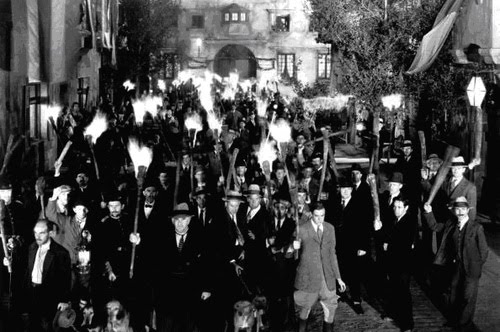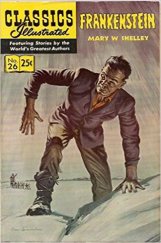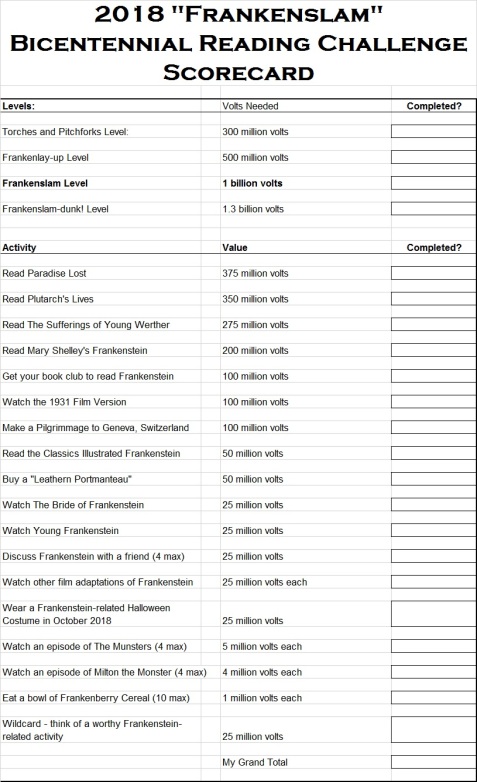2018 is the Bicentennial of the publication of Mary Shelley’s novel, Frankenstein. In honor of this occasion, I created for myself a reading challenge and – upon further reflection – decided to “make it public,” so here goes.

Just what is a “Frankenslam?” Well, when I first read Shelley’s novel – maybe 25 years ago – I remember being struck by how articulate and literate the “monster” was. Do you know how this came to be? If you haven’t read the book you won’t know, but even if you have you may have since forgotten. At a certain point in the novel, the monster is heading back to his “hovel” in the woods and stumbles upon someone’s lost “leathern portmanteau” which contains three books – a volume of Plutarch’s Lives (he doesn’t say specifically other than it contained the lives of the first leaders of the ancient republics, so maybe that can be intuited(?) – extra credit available there!) The second is Goethe’s The Sufferings of Young Werther (a.k.a. “The Sorrows of Young Werther”) and the third is John Milton’s Paradise Lost. My challenge to myself is to read all three of these in 2018, thus acquiring a similar ‘base knowledge’ to that of Frankenstein’s monster. Who’s with me??
To complete a Frankenslam, participants will need to accumulate One Billion (say these last two words like Dr. Evil if you want) Volts (according to nationalgeographic.com each bolt of lightning can contain up to a billion votes – get it?). How do you accumulate volts? By reading the three books, each having a value in volts:
Paradise Lost 375 million volts; Plutarch’s Lives – 350 million volts; The Sufferings of Young Werther – 275 million volts. If you can finish those three then, congratulations, you have completed a Frankenslam! Ideally, I and other Frankenslammers would also love to read a blog post describing your reaction to these three books (50 million volts) and how they helped shape the “monster,” but the most important thing is to READ them all.
Maybe you are more ambitious than that, though. If so, there’s also a ‘double secret’ level, the Frankenslam Dunk! Which you can earn if you also read the original Frankenstein novel itself (200 million volts) and watch the iconic 1931 film version (100 million volts) for a total of 1.3 Billion volts.
If you’re less ambitious, you can try The Frankenlay-up. Reading just one or two of the three books from the leathern portmanteau.

If you don’t have time to do so much reading, do a light-hearted Villagers with Pitchforks and Torches level and maybe just read the Classics Illustrated Comic Book  version of the novel (50 million volts), eat a bowl of Frankenberry cereal (10 million volts – I hope this is still around(?)), watch Young Frankenstein (25 million volts), watch The Bride of Frankenstein (25 million volts) and maybe a few episodes of The Munsters (5 million volts each). Watch an episode or two of the animated Milton the Monster series (for 4 million volts each).
version of the novel (50 million volts), eat a bowl of Frankenberry cereal (10 million volts – I hope this is still around(?)), watch Young Frankenstein (25 million volts), watch The Bride of Frankenstein (25 million volts) and maybe a few episodes of The Munsters (5 million volts each). Watch an episode or two of the animated Milton the Monster series (for 4 million volts each).
Other ways to accumulate points, er volts:
Convince your book club to read Frankenstein (100 million volts); Go to Geneva Switzerland, the “birthplace” of the novel (100 million volts). Discuss the novel with a reading friend who has read it (25 million volts; limit 4 friends). Buy a leathern portmanteau yourself to proudly carry evidence of your completing a Frankenslam.

So, have I got everyone “charged up” about this challenge?! You can follow your progress with the convenient scorecard below:

Okay, so yes, this really is kind of a tongue in cheek challenge, but seriously, wouldn’t it be worthy to have these three famous books under your belt? Do you know any readers in your circle who have read all three? I’d bet the number of people out there who have is a relatively small number. I suppose that Mary Shelley herself had read them so as to be able to include them effectively in her novel, but who else?? The only one I’ve read completely is The Sufferings of Young Werther. I’ve tried Paradise Lost before but without success. I’ve read a few individual lives of Plutarch but not a “volume” so I have a lot of reading to do.
Won’t you join me in this unique challenge for 2018? Leave a comment below and I’ll link to you on my sidebar. I’ll also post a “quarterly report” with my progress and updated scorecard.
From Chapter 15 of Mary Shelley’s Frankenstein:
“One night, during my accustomed visit to the neighbouring wood, where I collected my own food, and brought home firing for my protectors, I found on the ground a leathern portmanteau, containing several articles of dress and some books. I eagerly seized the prize, and returned with it to my hovel. Fortunately the books were written in the language the elements of which I had acquired at the cottage; they consisted of Paradise Lost, a volume of Plutarch’s Lives, and the Sorrows of Werter. The possession of these treasures gave me extreme delight; I now continually studied and exercised my mind upon these histories, whilst my friends were employed in their ordinary occupations.
“I can hardly describe to you the effect of these books. They produced in me an infinity of new images and feelings that sometimes raised me to ecstasy, but more frequently sunk me into the lowest dejection. In the Sorrows of Werter, besides the interest of its simple and affecting story, so many opinions are canvassed, and so many lights thrown upon what had hitherto been to me obscure subjects, that I found in it a never-ending source of speculation and astonishment. The gentle and domestic manners it described, combined with lofty sentiments and feelings, which had for their object something out of self, accorded well with my experience among my protectors, and with the wants which were for ever alive in my own bosom. But I thought Werter himself a more divine being than I had ever beheld or imagined; his character contained no pretension, but it sunk deep. The disquisitions upon death and suicide were calculated to fill me with wonder. I did not pretend to enter into the merits of the case, yet I inclined towards the opinions of the hero, whose extinction I wept, without precisely understanding it.
“As I read, however, I applied much personally to my own feelings and condition. I found myself similar, yet at the same time strangely unlike to the beings concerning whom I read, and to whose conversation I was a listener. I sympathised with, and partly understood them, but I was unformed in mind; I was dependent on none and related to none. ‘The path of my departure was free’; and there was none to lament my annihilation. My person was hideous and my stature gigantic. What did this mean? Who was I? What was I? Whence did I come? What was my destination? These questions continually recurred, but I was unable to solve them.
“The volume of Plutarch’s Lives, which I possessed, contained the histories of the first founders of the ancient republics. This book had a far different effect upon me from the Sorrows of Werter. I learned from Werter’s imaginations despondency and gloom: but Plutarch taught me high thoughts; he elevated me above the wretched sphere of my own reflections to admire and love the heroes of past ages. Many things I read surpassed my understanding and experience. I had a very confused knowledge of kingdoms, wide extents of country, mighty rivers, and boundless seas. But I was perfectly unacquainted with towns, and large assemblages of men. The cottage of my protectors had been the only school in which I had studied human nature; but this book developed new and mightier scenes of action. I read of men concerned in public affairs, governing or massacring their species. I felt the greatest ardour for virtue rise within me, and abhorrence for vice, as far as I understood the signification of those terms, relative as they were, as I applied them, to pleasure and pain alone. Induced by these feelings, I was of course led to admire peaceable lawgivers, Numa, Solon, and Lycurgus, in preference to Romulus and Theseus. The patriarchal lives of my protectors caused these impressions to take a firm hold on my mind; perhaps, if my first introduction to humanity had been made by a young soldier, burning for glory and slaughter, I should have been imbued with different sensations.
“But Paradise Lost excited different and far deeper emotions. I read it, as I had read the other volumes which had fallen into my hands, as a true history. It moved every feeling of wonder and awe that the picture of an omnipotent God warring with his creatures was capable of exciting. I often referred the several situations, as their similarity struck me, to my own. Like Adam, I was apparently united by no link to any other being in existence; but his state was far different from mine in every other respect. He had come forth from the hands of God a perfect creature, happy and prosperous, guarded by the especial care of his Creator; he was allowed to converse with, and acquire knowledge from, beings of a superior nature: but I was wretched, helpless, and alone. Many times I considered Satan as the fitter emblem of my condition; for often, like him, when I viewed the bliss of my protectors, the bitter gall of envy rose within me.
paula cappa said,
December 29, 2017 at 1:21 pm
This is wonderful, Jay! Can’t wait for your updates on this. I read Goethe’s The Sufferings of Young Werther many years ago and really didn’t appreciate it at the time. I may reread it now.
LikeLiked by 1 person
Jay said,
December 29, 2017 at 1:29 pm
Retreading would be a good start! 275 million volts worth! 🙂 I remember being really impressed with Werther when I read it about ten years ago. Looking forward to the reread!
LikeLike
Katherine Nabity said,
December 29, 2017 at 6:20 pm
Well, it *is* the bicentennial anniversary of its publichation, so this might be a good way to celebrate. But, dang, I’m going to need a reading plan. 😉
LikeLike
Dale said,
December 30, 2017 at 11:16 am
I love this! I have already read Paradise Lost – does it count if it wasn’t in 2018? I’ll be honest, I don’t plan on reading it again, but the other two could be interesting. And “Young Frankenstein”? I can watch that over and over again.
LikeLike
Carrie @ Cat on the Bookshelf said,
January 10, 2018 at 6:51 pm
I’m interested, but I read Paradise Lost last year and don’t want to promise to read it again this year. Good luck to all of you!
LikeLiked by 1 person
Jay said,
January 11, 2018 at 9:13 am
Thanks for comment, Carrie. If I’ve got to be honest, the thought of reading Paradise Lost scares the heck out of me. 🙂 I’ve read a couple “Lives” of Plutarch so far, but that’s the extent of my progress – I’m up to maybe 20 million volts…
LikeLike
Carrie @ Cat on the Bookshelf said,
January 11, 2018 at 3:50 pm
It can be done in chunks. I found it helpful to sometimes follow along with an audibook, and the arguments tell you the gist of each book.
LikeLiked by 1 person
Jay said,
January 11, 2018 at 4:42 pm
Thanks for the tip! 🙂
LikeLiked by 1 person
Ozeki said,
January 24, 2018 at 5:31 pm
This is such a great idea! Would you mind if I print this out for patrons to use at our public library?
LikeLike
Jay said,
January 24, 2018 at 5:33 pm
Not at all! Help yourself! (& where is your library, if you don’t mind my asking?)
LikeLike
Ozeki said,
January 29, 2018 at 3:47 pm
Thanks!!!! Oh I don’t mind at all. We’re in Northern Virginia, about an hour west of DC.
LikeLike
Jay said,
January 29, 2018 at 3:53 pm
Ah, okay. I wondered if you might be in Indiana – a lot of libraries here are doing readalongs, etc. in conjunction with the “One State, One Book” thing. Let me know if anything comes of your sharing the “challenge” with your patrons. Happy reading!
LikeLike
librarian92 said,
July 26, 2018 at 2:38 pm
May I share this on my Little Free Library blog? With full attribution, of course! https://division92lfl.wordpress.com/
LikeLike
Jay said,
July 26, 2018 at 3:35 pm
Absolutely!
LikeLike
librarian92 said,
July 26, 2018 at 3:41 pm
Thank you 🙂
LikeLike